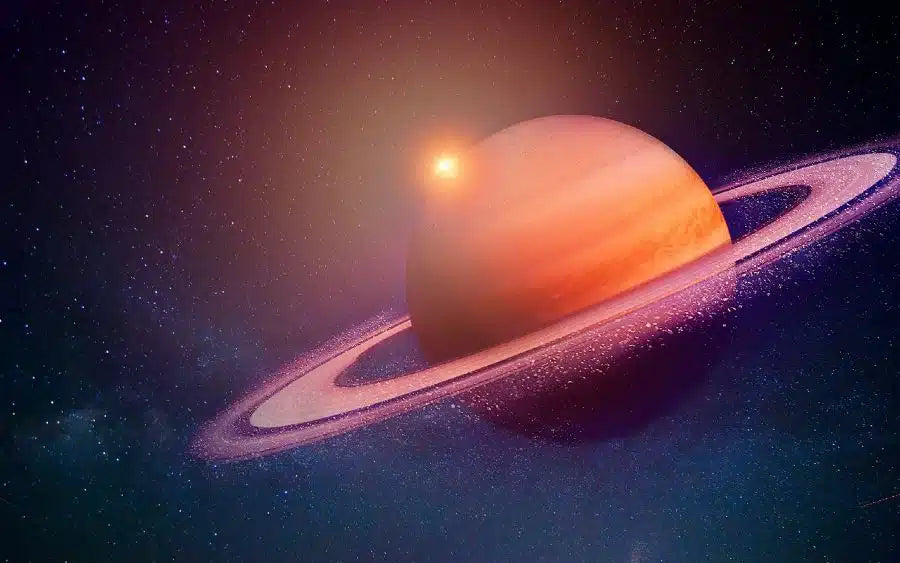
The Planets: The Role of Saturn in Astrology
Share
Saturn, the planet of Karma
The planet
Saturn is undoubtedly one of the most fascinating planets in the universe, having been observed for centuries, captivating us with its ring system that makes it unique in our Solar System. We're talking about the sixth planet from the Sun and the second most massive after Jupiter. Like Neptune, Uranus, and Jupiter, it is considered a gas giant, and its astronomical symbol is a representation of the sickle of the god of agriculture and the passage of time (Kronos).
According to the latest studies, Saturn is composed of 95% hydrogen and 3% helium, along with a mix of various other elements. Its core is made of silicates and ices and is surrounded by a very thick layer of metallic hydrogen, followed by another layer of gas. According to studies, winds in its atmosphere blow at nearly 2,000 km/h: a light breeze even stronger than those found on Jupiter.
What is undoubtedly fascinating and what immediately distinguishes Saturn from the other planets is its conspicuous ring system, which collects particles of ice and silicate dust. This planet has approximately 60 moons orbiting it, and only one of these, Titan, appears to have a significant atmosphere.
Saturn completes a complete revolution around the Sun in 29,458 Earth years, and sunlight, as seen from Saturn, is about 100 times fainter than it is from Earth. Compared to our planet, Saturn is more than 95,000 times more massive and 744 times larger in volume, making it the second-largest planet in the Solar System, after Jupiter.
Saturn-Cronos in mythology
According to Greek mythology, Cronus, Kronos, was the youngest son of Uranus, or Heaven, and Gaia, or Earth. He was therefore a Titan who belonged to the generation that preceded the Olympian gods. Cronus was instigated by his mother to cut off his father's testicles with a sickle. But as soon as this castration was performed and he took his place, his father Uranus predicted that he, Kronos, too, would be dethroned by one of his sons. This drove Cronus to one of the most horrendous acts ever conceived: after marrying his sister Rhea and impregnating her several times, he had the habit, at the moment of childbirth, of tearing the child from her hands and swallowing it. In this way he thought he could foil his father Uranus's prediction.
His plan was thwarted when Rhea, pregnant with Zeus, offered Cronus a stone wrapped in cloths in place of the unborn child. This allowed him to keep baby Zeus alive, under his own guidance and that of Metis, one of the daughters of Oceanus. Once Zeus grew up, Rhea and Metis helped him make his father drink a potion that made him vomit all the children he had previously devoured.
The sons, led by Zeus, finally defeated their father once and for all. Once the war was over, Zeus took over the reign of the universe from his father, Kronos-Saturn, managing everything from his abode on Mount Olympus. The generation of Olympian gods had finally seized dominion and control over the entire universe.
In ancient times, there were days dedicated to Saturn, called " Saturnalia ." These took place in December and were filled with rites designed to celebrate the changes of the year. These rituals overturned everything, disrupting order: masters and slaves swapped roles, courts were closed, and gambling was encouraged. Some scholars point to a certain connection between our Carnival season and the Saturnalia.
Precisely because of its underlying mythology, its astronomical and astrological characteristics, Saturn is considered the planet of the Force of Retraction, linked to a symbolism inherent in rules, control, and structures. Its archetype is that of the sage, and it is in fact linked to grandparents and the elderly. Its dark side speaks of severity, rigidity, coldness, aridity, pessimism...
His zodiac cycle lasts 29 and a half years, as already mentioned, and his domicile is in Capricorn and Aquarius, while his exile is in Cancer and Leo, his exaltation in Libra and his fall in Aries.
Saturn in the birth chart
Saturn represents a sort of counterpart to Jupiter: while the largest planet in the Solar System represents expansion and adaptability, Saturn, the second largest, represents restriction and structure. But limitations, on a psychological level, also prove crucial, since without restrictive control, expansion could become excessive and lead to a loss of sense of reality. Saturn helps us keep our feet on the ground, so to speak.
The limitations and losses represented by Saturn therefore play a fundamental role for humanity: they structure and deepen and develop our psychological foundation. Only through this planet can we forge our own moral system, a fundamental part of our personality. It allows us to internalize the concept of authority and learn the meaning of responsibility for our choices and actions. We could therefore say that Saturn helps develop our conscience and leads us to adulthood. Indeed, the position of this planet in our birth chart provides insight into the problems we will face in our lives and how we will address them.
To move to higher states of consciousness or awareness, it's necessary to learn lessons, sometimes very difficult ones. Advancement is always linked to a challenge to be overcome. In fact, Saturn, in the birth chart, also plays a significant role in work and professional life, in achieving success. This planet, viewed positively, brings wisdom, reliability, consistency, patience, and awareness. On the negative side, however, it speaks of depression, fear of life, melancholy, a lack of human warmth, rigidity, and anguish.
See also the meaning of others Planets in Astrology
